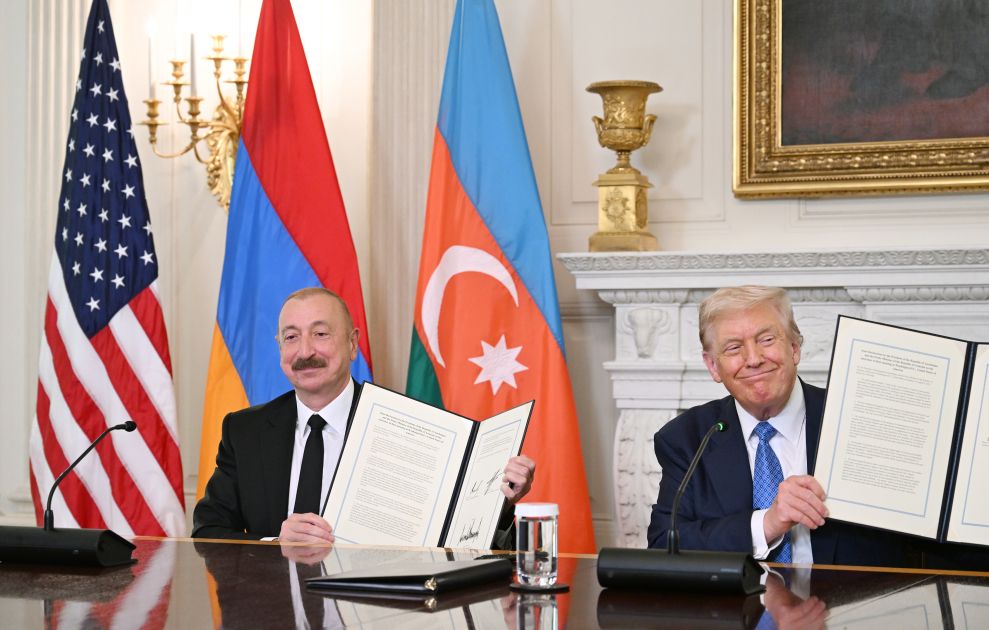South Caucasus stability gets boost from Azerbaijan-US strategic charter

On August 8, 2025, the international community witnessed a significant shift in the geopolitical landscape of the South Caucasus, a testament to the enduring impact of Azerbaijan’s strategic leadership under President Ilham Aliyev. Despite its relatively small size on the global stage, Azerbaijan occupies a critical geopolitical crossroads whose stability has ramifications far beyond its borders. The trilateral meeting held on this date not only marked a thaw in previously strained Azerbaijan–United States relations but also signaled a broader recalibration of regional alliances and energy geopolitics.
The origins and impact of section 907
Central to the discussion was Article 907 of the Freedom Support Act, an amendment passed by the U.S. Congress in 1992 that effectively barred direct American aid to Azerbaijan’s government. This legislative barrier, heavily influenced by Armenian lobbying efforts, was emblematic of the prolonged diplomatic friction rooted in "the Nagorno-Karabakh" conflict. For over three decades, this amendment served not only as a legal impediment but also as a political symbol of the West’s complicated stance on Azerbaijan.
The amendment’s persistence hindered Azerbaijan’s ability to fully engage with one of the world’s most powerful allies during a critical post-Soviet transition period. Azerbaijan, isolated by sanctions that no other former Soviet republic faced, struggled to attract vital foreign investment and assistance. This historical context underscores how legislative tools, often shaped by narrow interest groups, can have outsized impacts on international relations and economic development.
The strategic pivot: From sanctions to partnership
However, the geopolitical calculus began to shift by the mid-1990s. The landmark “Contract of the Century” in 1994 - an oil development agreement, including American companies - highlighted Azerbaijan’s growing significance as an energy supplier and geopolitical actor. This pivotal moment marked the beginning of a gradual thaw in relations, as the United States increasingly recognized Azerbaijan’s potential as a strategic partner, particularly in light of its geostrategic location, which connects Europe and Asia.
The post-9/11 global security environment accelerated this partnership. The U.S. reliance on Azerbaijan’s transportation routes for its military operations in Afghanistan led to repeated presidential waivers suspending Article 907, reflecting a pragmatic approach that prioritized security cooperation over earlier political restrictions. Yet, this cooperation remained fragile, and the Biden administration’s 2023 decision to reimpose sanctions revealed the volatility and complexity of U.S.-Azerbaijan relations, which were marked by distrust and competing geopolitical interests.
With energy at its core, Azerbaijan developed key infrastructure such as the Baku–Tbilisi–Ceyhan oil pipeline and the Southern Gas Corridor, including the TANAP and TAP pipelines, delivering energy resources to European markets. These projects not only brought economic dividends but also positioned Azerbaijan as a critical partner for Europe, especially as the continent sought to diversify away from Russian energy dependence.
Today, Azerbaijan exports natural gas to 10 European countries and is in talks to expand this to 11 with ongoing negotiations with Ukraine. Recent exports to Syria further extend this energy footprint. These developments have shifted Azerbaijan’s role from an aid recipient to a strategic energy hub and even a donor country.
President Ilham Aliyev highlighted this in his August 8 interview in Washington, stating:
“Today, Azerbaijan does not need foreign assistance; we do not depend on it. Our economy is stable; our foreign debt is less than 7% of GDP. We have become a donor country ourselves. Therefore, Section 907 now mainly has political and symbolic meaning. It demonstrates that this injustice no longer exists.”
The path to peace
The recent Patriotic War in Azerbaijan, triggered by Armenian provocations aimed at destabilizing critical energy infrastructure, underscores the enduring volatility of the region. Armenia’s prolonged occupation policies have inflicted heavy economic and human costs on both sides, reinforcing the urgent need for a durable peace framework. Azerbaijan’s post-conflict reconstruction efforts, including mine clearance and infrastructure rebuilding, reflect a forward-looking strategy aimed at transforming security gains into sustainable development.
President Ilham Aliyev’s remarks during his Washington interview on August 8 capture the significance of the symbolic waiver signed by former President Donald Trump. The gesture marked not only a rectification of decades-old injustice but also a clear political signal of a new era in bilateral relations - one characterized by mutual respect and strategic cooperation.
Implications for regional stability and global partnerships
The strategic working group established alongside the waiver signing aims to formalize and deepen U.S.-Azerbaijan relations through a Charter on Strategic Partnership. This institutionalization of bilateral ties is likely to foster enhanced cooperation in security, energy, and economic sectors and contribute to the broader stability of the South Caucasus.
Moreover, Azerbaijan’s evolving role serves as a case study in how small states can leverage geostrategic assets and pragmatic diplomacy to reshape their international standing. The recent rapprochement also sends a powerful message to regional actors and global powers alike: economic interdependence and mutual respect can create pathways to peace even in historically contested spaces.
The events of August 8, 2025, symbolize more than just a diplomatic milestone; they represent the fruition of Azerbaijan’s long-term strategic vision. By navigating complex geopolitical challenges, overcoming legislative obstacles like Article 907, and capitalizing on its energy resources and geographic position, Azerbaijan is redefining its role on the world stage.
Here we are to serve you with news right now. It does not cost much, but worth your attention.
Choose to support open, independent, quality journalism and subscribe on a monthly basis.
By subscribing to our online newspaper, you can have full digital access to all news, analysis, and much more.
You can also follow AzerNEWS on Twitter @AzerNewsAz or Facebook @AzerNewsNewspaper
Thank you!

